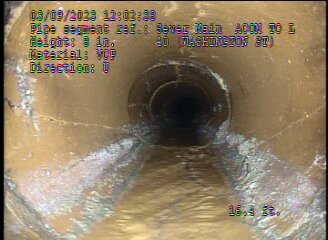In a video probe screenshot taken near the intersection of Washington and Adams Streets, a buildup of sediment has built up in the asbestos concrete pipe over time, damaging and cracking the main sewer system.
Photo courtesy of RH2 Engineering, Pro-Vac, City of Port Townsend
After reviewing two repair options — one at $4 million and the other at $2.6 million — Port Townsend City Council unanimously approved the lower-cost alternative to repairing its aging sewer system.
During last week’s council meeting, city officials were told that engineers had determined the sewer line between the Port Townsend ferry terminal and Gaines Street was in “critical condition”.
According to an analysis and video inspection conducted by RH2 Engineering of Bothell, most of the pipes have significant internal sediment which has hampered the Company’s ability to fully inspect the main sewer.
“This pipeline has a 56-year lifespan and it has reached the end of its useful life,” said John Hendron, consultant at RH2.
The need to repair the sewer line became apparent after a hiatus in late December caused sewage to overflow at the intersection of Gaines Street and Water Street.
The 14-inch pipe, about 10 feet underground, was damaged by a flood late last year.
“When we dug the pipe out of the ground, it was a gooey mess,” said Steve King, director of public works.
Based on the results, the consultants proposed two options for repairing the main sewerage system.
“It’s classic, this failure here,” Hendron said. “We’ve seen it in other communities in the Northwest, such as the city of Tukwila; Poulsbo; Kitsap County Public Works and their Old Town Silverdale.”
The first option involves an open cut of the existing pipe, running 18 or 24 inch polymer pipe approximately 2,000 feet of the line at its current location. This would cost the city approximately $4 million and have significant structural impact on Water Street and the surrounding area.
Given the structural implications and high cost of the first plan, the city council opted for the second option. This plan calls for directional drilling to install just over 1,500 feet of new high density polyethylene pipe and an additional 1,050 feet of polyethylene pipe to be slid into the existing asbestos concrete pipe.
The decision also includes the complete remodeling of the Monroe Street pumping station and possibly moving the pumping station to another location nearby.
“This is a much more elegant and cost-effective solution,” Hendron said. “It would take less time and cause less disruption to traffic. And hopefully we can start that this winter.”
Councilor Libby Urner Wennstrom questioned the possible downsides of the $2.6 million plan.
“Directional drilling works until you hit a boulder, so there’s a chance you’ll have to dig up the roadside,” King replied. “I’d say that’s still far less intrusive than digging up the entirety of Water Street.”
Another benefit is reliability.
“Directional drilling has become much more reliable over the past 20 years,” Hendron said. “It used to be a real challenge, but the equipment is much better now.”
Given the multimillion-dollar costs — which could escalate from unexpected construction costs — the city is hoping for a low-interest loan.
“I suppose if we scraped every penny together, we could fund that from our reserves. But it wouldn’t be a fun situation,” King said. “We’re really considering a loan from the Public Works Trust Fund Board.”
If all goes as planned, the city could get a low-interest loan from the state in early August. The loan would come with one
According to the city administration, the interest rate is 0.5 to 1.5 percent.
Council members expressed their support for the lower-cost approach.
“I really appreciate that we’re dealing with this before it completely collapses and falls apart,” Councilor Amy Howard said. “Nobody likes to spend $4 million or $2.6 million on poop, but if we don’t, we’re in a really bad situation.”
“It will cost our community more. But the alternative is that we don’t. And it costs them a lot more later on,” Mayor David Faber said.
“Maybe it’s Sophie’s decision, but it’s better to add a little cost now than add a lot of money later,” he said.



Comments are closed.